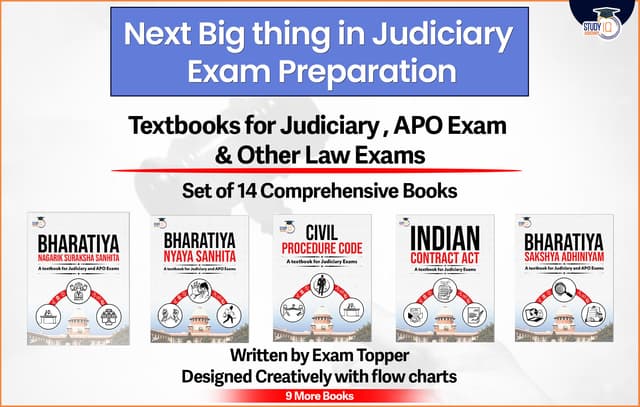Table of Contents
The Indian government has implemented new regulatory measures for Ladakh, aiming to tackle persistent issues raised by its residents, particularly those related to land ownership, employment opportunities, and safeguarding their distinct cultural heritage. These measures come in response to growing demands for greater autonomy and legal assurances that protect the region’s unique identity, concerns that have been amplified since Ladakh was formally separated from Jammu and Kashmir in 2019.
By introducing these regulations, the government seeks to address apprehensions among the local population and ensure that the socio-economic and cultural fabric of Ladakh remains intact while navigating its administrative transition.
Centre Notified New Regulations for Jobs and Domicile in Ladakh
Centre’s new regulations for jobs and domicile in Ladakh, where they fall short” discusses a series of regulations introduced by the Indian government in June 2025, aimed at addressing longstanding concerns in Ladakh regarding employment, cultural preservation, and administrative clarity.
On June 2, 2025, the President of India approved the Union Territory of Ladakh Reservation (Amendment) Regulation, 2025, introducing significant changes to the reservation framework for government employment and educational admissions in Ladakh. This amendment revises existing criteria and limits to ensure a more structured approach to reservations. The revised provisions officially take effect from June 3, 2025.
The regulation modifies the Jammu and Kashmir Reservation Act, 2004, as applied to Ladakh, increasing the total reservation cap to 85%, excluding quotas for Economically Weaker Sections (EWS). It aims to enhance opportunities for local communities while maintaining a balance in recruitment and admissions. Additionally, the amendment aligns with broader efforts to provide constitutional safeguards for Ladakh’s residents following its transition to a Union Territory.
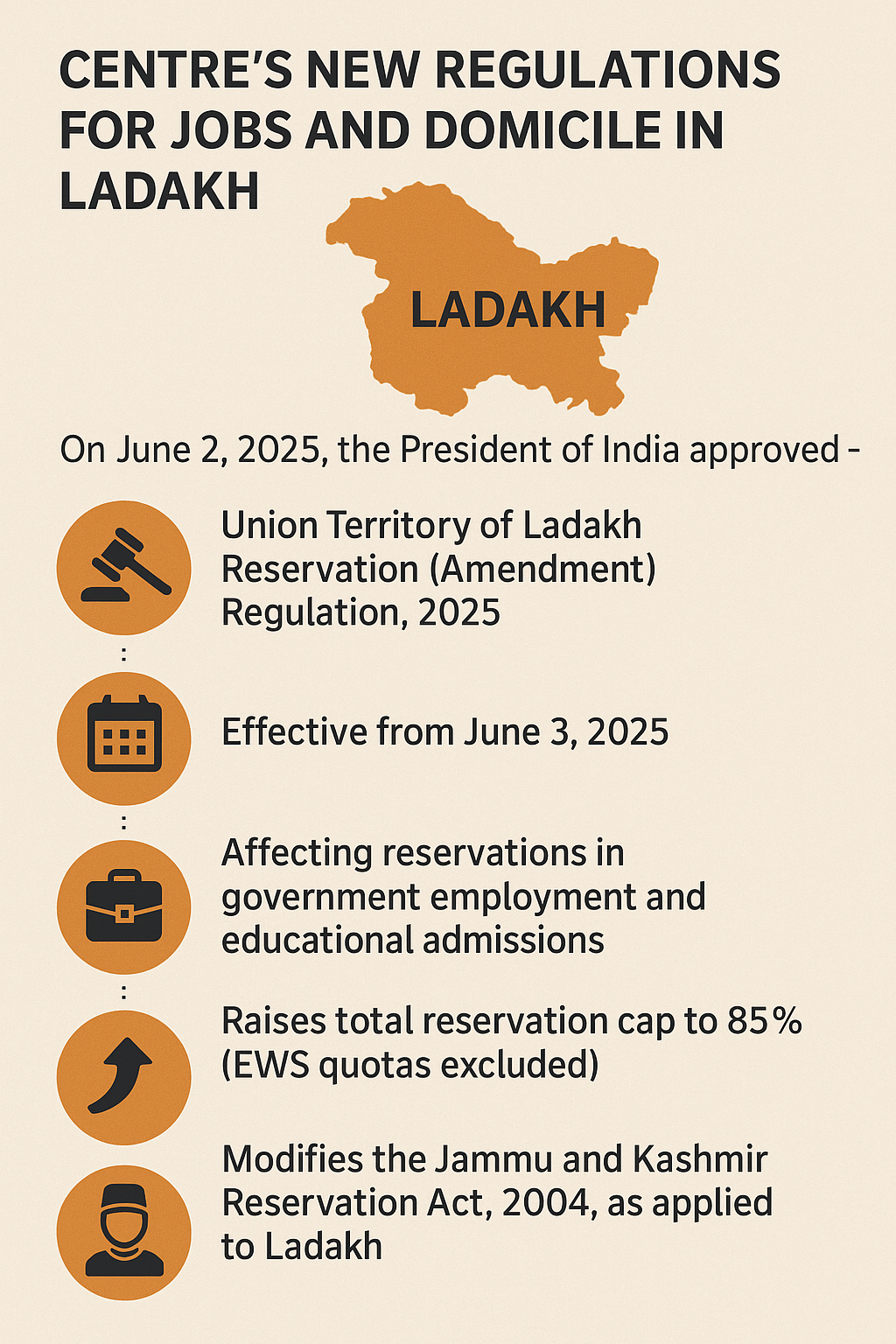
| About Ladakh |
|
Key Regulations Introduced in Ladakh
- Domicile-Based Job Reservation: The Ladakh Civil Services Decentralization and Recruitment (Amendment) Regulation, 2025, mandates that government job applicants must be domiciled in Ladakh. A domicile is defined as someone who has resided in Ladakh for 15 years, studied there for seven years and appeared in Class 10 or 12 examinations, or is a child/spouse of a domicile or a central government employee who served in Ladakh for at least 10 years.
- Domicile Certification Process: The Ladakh Civil Services Domicile Certificate Rules, 2025, outline the procedure for obtaining domicile certificates. Applications can be submitted both physically and electronically, with the tehsildar as the issuing authority and the Deputy Commissioner as the appellate authority.
- Expanded Reservation Quotas: The Union Territory of Ladakh Reservation (Amendment) Regulation, 2025, increases the total reservation for Scheduled Castes (SC), Scheduled Tribes (ST), Other Backward Classes (OBC), and other socially and educationally backward groups to 85%, excluding the 10% reservation for Economically Weaker Sections (EWS). This expansion also applies to admissions in professional institutions like engineering and medical colleges.
- Recognition of Local Languages: The Ladakh Official Languages Regulation, 2025, officially recognizes local languages, including Ladakhi, Balti, and Shina, for use in official communication and education, aiming to preserve the region’s linguistic heritage.
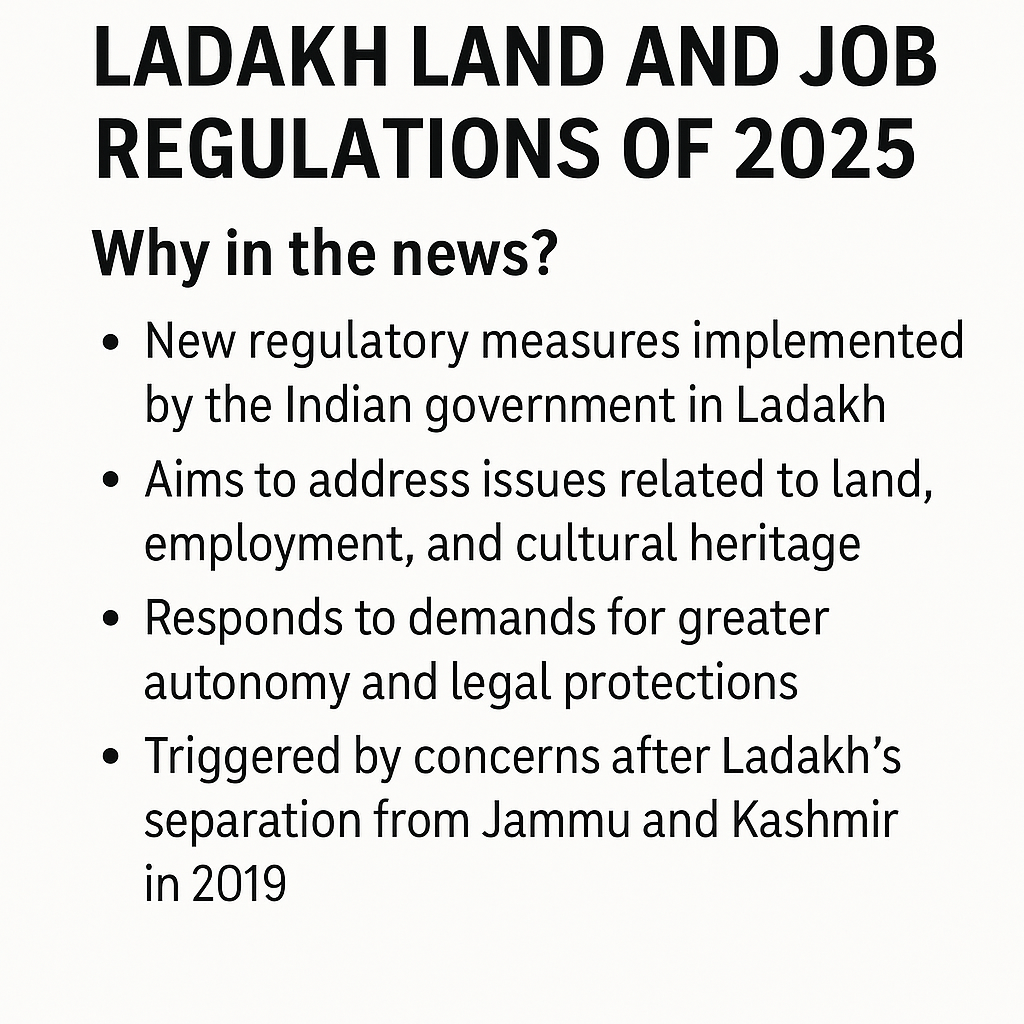
About New Regulations for Jobs and Domicile in Ladakh
The Indian government issued five significant regulatory measures on June 2 and 3, 2025, aimed at refining governance and addressing local concerns in Ladakh. Among these, the Ladakh Civil Services Decentralisation and Recruitment (Amendment) Regulation, 2025, introduces new domicile requirements for individuals seeking government employment in the region.
Under this regulation, eligibility for recruitment is now contingent upon domicile status, which is granted to individuals who have either resided in Ladakh for a minimum of 15 years or have completed their formal education within the territory. This amendment is designed to ensure that government job opportunities primarily benefit long-term residents, thereby reinforcing local representation within the civil services and securing employment prospects for those deeply rooted in Ladakh’s social and economic landscape.
Domicile Certification Process in Ladakh
The Ladakh Civil Services Domicile Certificate Rules, 2025, establish a structured procedure for acquiring domicile certification in the Union Territory of Ladakh. These rules define eligibility criteria, the application process, and the authorities responsible for issuing and reviewing domicile certificates.
Under this framework, the Tehsildar is designated as the Competent Authority responsible for issuing domicile certificates. If an applicant’s request is denied or disputed, the Deputy Commissioner serves as the Appellate Authority, handling appeals and ensuring procedural fairness.
Applicants can submit their requests either physically or electronically, providing necessary documentation to verify their eligibility. The rules categorize individuals eligible for domicile status, including long-term residents, students who have studied in Ladakh for a specified period, and children of government officials who have served in the region for a defined duration.
Revised Reservation Framework in Ladakh
The Union Territory of Ladakh Reservation (Amendment) Regulation, 2025, introduces significant changes to the reservation policy for government jobs and educational institutions in Ladakh. This amendment raises the reservation cap from 50% to 85%, ensuring broader representation for marginalized communities in both employment and academic admissions.
Under the revised framework, Scheduled Castes (SCs), Scheduled Tribes (STs), Other Backward Classes (OBCs), and other designated backward groups will benefit from this increased quota. The regulation specifically applies to government recruitment processes and admissions to professional institutions, such as medical and engineering colleges.
Additionally, the amendment excludes reservations for Economically Weaker Sections (EWS) from the 85% cap, meaning EWS reservations will be governed by separate provisions. This move aims to balance affirmative action policies while ensuring equitable access to opportunities for historically disadvantaged groups.
Women’s Representation in Ladakh’s Hill Councils
The Ladakh Autonomous Hill Development Councils (Amendment) Regulation, 2025, introduces a significant reform by mandating that one-third of all seats in the Leh and Kargil councils be reserved for women. This measure is designed to increase female participation in local governance, ensuring that women have a stronger voice in decision-making processes.
Under this amendment, the reserved seats will be allocated on a rotational basis across different territorial constituencies, ensuring equitable representation over time. This approach aligns with broader national efforts to enhance gender inclusivity in governance structures, reflecting the principles of the Nari Shakti Vandan Act, which promotes women’s political empowerment.
By institutionalising women’s representation, the regulation aims to foster leadership opportunities, encourage policy-making that addresses gender-specific concerns, and create a more balanced governance framework in Ladakh.
Importance of the New Legal Framework for Ladakh
The Union Territory of Ladakh Regulations, 2025, mark a significant milestone as the first comprehensive legal framework specifically designed for Ladakh. These regulations introduce structured policies to address key concerns, particularly in areas such as job reservations, domicile eligibility, language recognition, and women’s representation in governance.
By formalising reservation quotas and domicile rules, the regulations aim to safeguard employment opportunities for local residents while ensuring cultural preservation through official language recognition. The inclusion of one-third reserved seats for women in the Ladakh Autonomous Hill Development Councils further strengthens gender representation in decision-making bodies.
However, despite these advancements, the regulations do not provide constitutional protections or restrict land ownership by non-domiciles, which remain pressing concerns for Ladakh’s residents. Many local leaders and advocacy groups continue to push for Sixth Schedule status, which would grant greater autonomy and legal safeguards to protect Ladakh’s unique identity and resources.
Significance of the Regulations
- First legal framework for Ladakh since 2019 UT creation.
- Addresses job reservations, language recognition, and women’s representation.
- Falls short of Sixth Schedule demands:
- No land protection (outsiders can still buy land).
- No legislative powers for Hill Councils (only administrative).
- Executive orders (Article 240) can be revoked (unlike constitutional safeguards).
Future Prospects for Ladakh’s Governance
While the newly introduced regulations mark a significant step toward addressing local concerns, Ladakhi leaders remain cautiously optimistic about their long-term impact. The reforms provide a structured framework for job reservations, domicile eligibility, language recognition, and women’s representation, but they fall short of granting full constitutional protections that many residents have been advocating for.
A key demand from civil society groups and political representatives is the inclusion of Ladakh under the Sixth Schedule of the Constitution, which would grant greater autonomy and legal safeguards for the region’s tribal communities. This status would enable self-governance through autonomous councils, ensuring local control over land, resources, and cultural preservation.
In response, Ladakhi civil society organisations plan to engage with the central government to push for further legislative measures that address land ownership concerns, constitutional protections, and governance autonomy. Discussions between local representatives and policymakers are expected to continue, shaping the next phase of Ladakh’s political and administrative future.
Criticisms and Limitations
While these regulations address certain demands, they fall short in key areas:
- Land Ownership Restrictions: The regulations do not address the demand to restrict land ownership by outsiders, a significant concern for locals fearing demographic changes and loss of cultural identity.
- Sixth Schedule Inclusion: There is no provision for including Ladakh under the Sixth Schedule of the Constitution, which would grant greater autonomy and protect tribal rights, a major demand from local leaders and activists.
- Implementation Challenges: Concerns remain about the effective implementation of these regulations, especially given Ladakh’s unique administrative setup without a legislative assembly, which potentially limits local participation in governance.
In summary, while the new regulations mark progress in addressing some of Ladakh’s concerns post the abrogation of Article 370, significant issues like land rights and greater autonomy remain unaddressed, leading to continued demands from local stakeholders for more comprehensive solutions.
Abrogation of Article 370 of Constitution of India
The abrogation of Article 370 refers to the Indian government’s formal decision to revoke the special status that was previously granted to Jammu and Kashmir under the Indian Constitution. Article 370 was included in the Indian Constitution as a temporary provision intended to facilitate the accession of Jammu and Kashmira princely state with its own distinct identity and level of autonomy into India following the 1947 partition.
Under this article, Jammu and Kashmir was allowed to have its constitution, flag, and autonomy over most matters, except defence, foreign affairs, and communications. The arrangement was meant to be transitional, respecting the unique historical, cultural, and political conditions of the state. In legal and constitutional terms, “abrogation” means the formal repeal or annulment of a law or provision. Therefore, the abrogation of Article 370 in 2019 signified the official revocation of the special, autonomous status of Jammu and Kashmir. This decision was enacted through a series of constitutional manoeuvres, including:
- A Presidential Order that effectively nullified the relevant parts of Jammu and Kashmir’s constitution, and
- Resolutions passed by both houses of the Indian Parliament indicated that the special autonomy was no longer in effect.
With the abrogation, the central laws of India became uniformly applicable to the entire region. Moreover, the state was reorganised into two union territories: Jammu and Kashmir and Ladakh. The legal rationale was partly based on the understanding that Article 370 was always intended to be a temporary provision, a remnant of the conditions at the time of accession, and did not carry the permanence of other constitutional provisions.
Before the abrogation, Jammu and Kashmir operated under a distinct legal framework, which created differences in areas such as property rights, employment, and legislative procedures compared to other parts of India. With the abrogation:
- All provisions of the Indian Constitution now apply in Jammu and Kashmir just as they do in other states and union territories.
- The former state was divided into two union territories, resulting in a new administrative structure directly overseen by the central government.
- The move sparked extensive debate. Proponents argue that it has strengthened national integration and the potential for socio-economic development. On the other hand, opponents contend that it undermines the unique identity and longstanding autonomy of the region’s people and has contributed to political and social disruptions.
The abrogation is one of the most significant constitutional decisions in modern India. It has led to vigorous discussions about regional identity, state autonomy, and the extent of central power. Numerous legal challenges have emerged, questioning the process and constitutional validity of the move. The abrogation of Article 370 marks a pivotal moment in India’s constitutional evolution, reflecting the tension between regional autonomy and national integration.
It remains a subject of intense legal analysis and public discourse, with its long-term implications for governance, development, and the rights of the people in Jammu and Kashmir continuing to unfold.
In In Re: Article 370 Abrogation, a 5-judge Constitution Bench of the Supreme Court unanimously upheld the abrogation, stating:
- Article 370 was a temporary provision and did not acquire permanent character despite the dissolution of J&K’s Constituent Assembly.
- President’s Rule under Article 356 enabled Parliament to legitimately assume legislative functions, including consenting to constitutional changes.
- President’s power under Article 370(3) was not fettered once the Constituent Assembly ceased to exist.
- The use of Article 367 to interpret “Constituent Assembly” as “Legislative Assembly” was not unconstitutional, considering executive necessity and the doctrine of necessity.
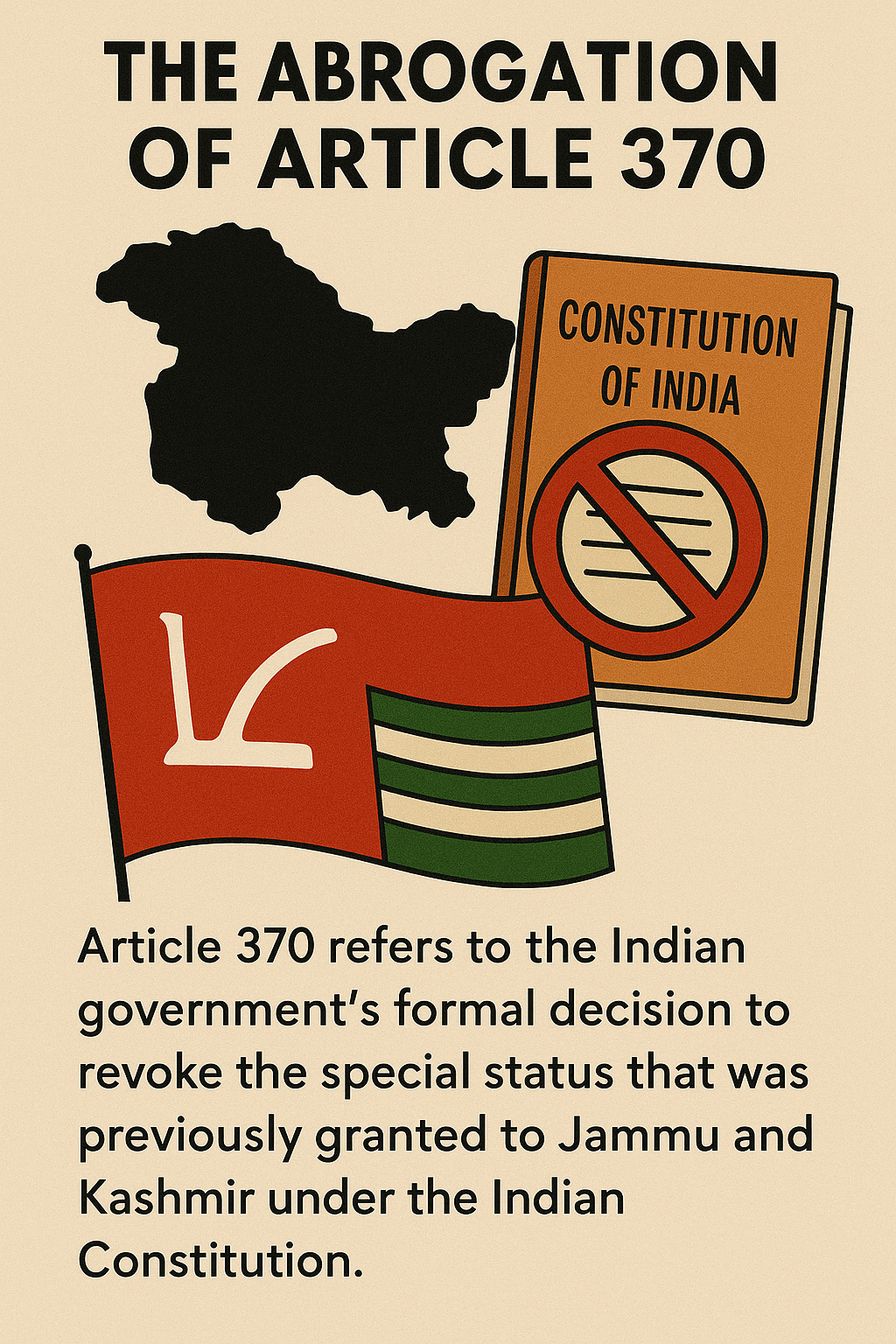
6th Schedule of Constitution of India
The Sixth Schedule of the Indian Constitution outlines provisions to promote self-governance and protect the cultural and economic interests of tribal communities in select northeastern states. Recognising the distinct social structures and traditions of these communities, the Sixth Schedule aims to align governance with their unique needs. Its primary goals include establishing a framework for tribal autonomy, safeguarding land and resources from exploitation, and empowering communities to maintain their cultural heritage while being part of the broader state framework. This schedule functions as a constitutional safeguard, balancing state authority with community autonomy.
It creates a structured governance model for tribal areas, including autonomous districts and regions based on tribal demographics, with the Governor empowered to establish distinct regions for diverse tribal communities. Each autonomous district is managed by a District Council, with up to 30 members comprising both elected and Governor-appointed representatives. Additionally, separate Regional Councils can be formed for districts with multiple tribal communities, with these councils having legislative, judicial, and financial authority over local matters, all subject to the Governor’s approval. This framework promotes decentralization and enables communities to tackle specific challenges effectively.
The councils also possess the authority to enact laws tailored to local needs, covering the management of land and forest resources, the regulation of social and economic practices, and local governance. Furthermore, local councils can establish courts to resolve disputes among community members, ensuring adherence to customary laws and practices. Such provisions facilitate participatory governance, aligning it with tribal customs and supporting social justice.
The Sixth Schedule is significant for its role in cultural preservation, formalizing self-governance and helping to maintain the identity and traditions of tribal groups, while also aiming to foster equitable economic and social development by protecting local resources. Finally, while it allows for substantial local governance, it maintains coherence within the wider legal framework of India, which helps prevent alienation and enables access to broader policies. However, the implementation of the Sixth Schedule faces various challenges, reflecting the complexities of tribal governance and integration.

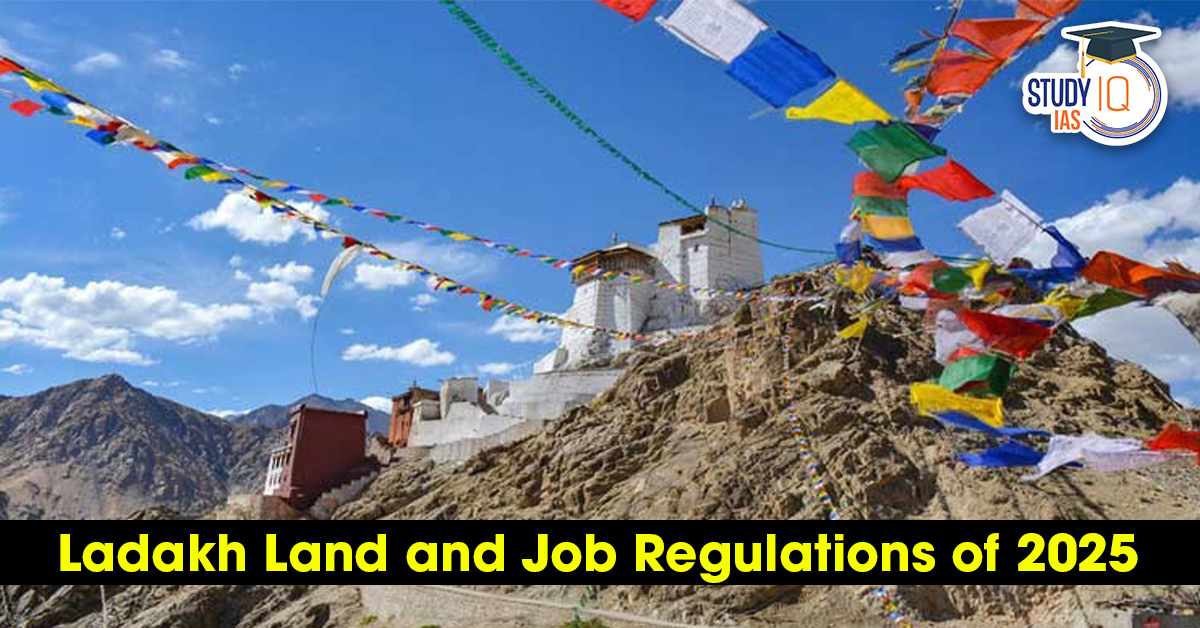
 Warring Couples Cannot Make Courts Their...
Warring Couples Cannot Make Courts Their...
 Tackling Child Trafficking in India: Leg...
Tackling Child Trafficking in India: Leg...
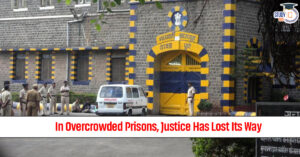 In Overcrowded Prisons, Justice Has Lost...
In Overcrowded Prisons, Justice Has Lost...






